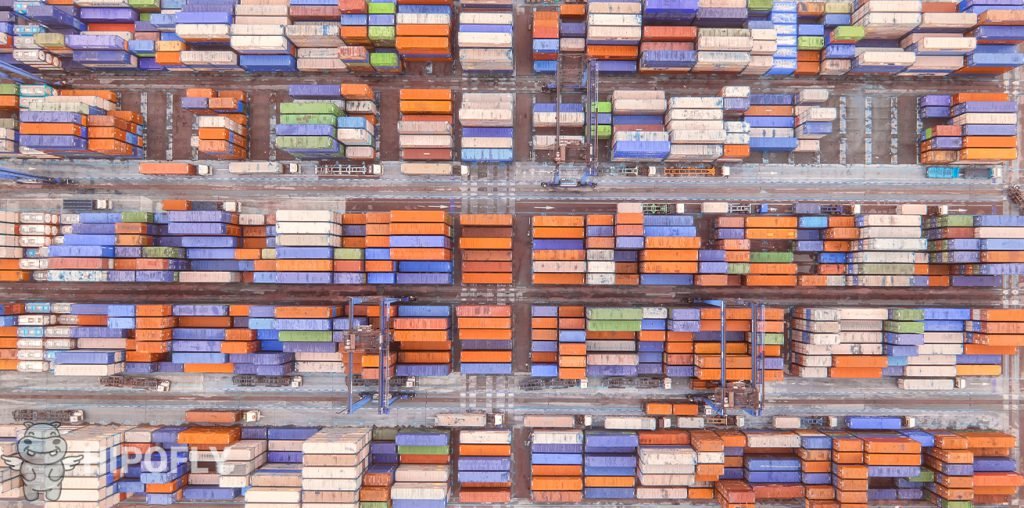Bulk shipping has been an essential part of shipping types (hipofly.com/air-freight-from-china/" data-type="page" data-id="1472" target="_blank" rel="noreferrer noopener">Air freight, Sea freight, Express shipping and Door-to-Door) and international trade for centuries, as it allows for the efficient and cost-effective transportation of large volumes of goods across long distances. The size and scale of bulk shipping operations have increased significantly in recent decades, driven by global trade growth and new technologies and infrastructure development. In this article, we talk about Bulk shipping and bulk carriers.
We suggest the following guide if you need to ship large cargo.
Are you looking for a reliable bulk shipping company that can safely and efficiently transport your goods safely and efficiently? Look no further than our company!
We specialize in providing top-quality bulk shipping services for a wide range of cargo, from minerals and ores to grains, chemicals, and more. Our state-of-the-art vessels are designed to handle shipping from china to UAE even the most challenging cargo types and transport them UAE across long distances quickly and cost-effectively.
We are committed to safety, quality, and environmental protection. Our highly trained crew and staff work tirelessly to ensure your cargo is handled carefully and carefully at every stage of the shipping process. We also use the latest technology and equipment to monitor and track your cargo, so you can have peace of mind knowing that your shipment is in good hands.
Whether you need a one-time shipment or ongoing Bulk shipping services, we are here to meet your needs. We offer flexible and customized shipping solutions tailored to your requirements, including packaging, loading, unloading, and delivery. Whit Hipofly team You can Bulk hipofly.com/shipping-china-to-uae/" data-type="page" data-id="10372">shipping from China to UAE, hipofly.com/shipping-china-to-iran/" data-type="page" data-id="10633">Bulk cargo to Iran, hipofly.com/shipping-service-from-china-to-kuwait/" data-type="page" data-id="12135">Bulk transport to Kuwait, and Bulk shipping to any country in the world.
Please don’t settle for anything less than the best regarding bulk shipping. Contact us today to learn more about our services and how we can help you transport your cargo with confidence and ease.

what is bulk shipping?
Bulk shipping refers to transporting large quantities of goods or commodities in loose or unpackaged form, such as grains, minerals, ores, coal, petroleum, chemicals, and other materials. This shipping method requires specialized vessels designed to handle and transport specific types of cargo.
Bulk shipping is an essential aspect of international trade, enabling the efficient and cost-effective movement of large volumes of goods across long distances. Bulk shipping can involve different modes of transportation, such as ships, trains, trucks, and barges, depending on the cargo’s nature, the shipment’s origin and destination, and other factors.
Compared to containerized shipping, which involves standardized containers, bulk shipping is often used for commodities that are not easily packed or transferred, for which packaging and handling costs would be prohibitively expensive. However, bulk shipping poses significant challenges and risks, such as environmental pollution, safety hazards, and logistical complexities, which require careful planning and management.
Benefits of Bulk Shipping
Bulk shipping offers many benefits for businesses transporting large quantities of goods. By choosing this option, companies can reduce costs, improve efficiency, and minimize their environmental impact, all while ensuring their cargo’s safe and timely transportation.
Here are some of the critical benefits of bulk shipping:
- Cost-Effective: Bulk shipping is often more cost-effective than other forms of transportation, such as containerized shipping, as it allows for transporting large volumes of goods in a single shipment. This reduces handling and packaging costs and can lead to significant cost savings for businesses.
- Efficient: Bulk shipping vessels are designed to maximize cargo capacity and loading/unloading efficiency, which reduces turnaround times and improves supply chain efficiency.
- Flexibility: Bulk shipping can accommodate various cargo types, from grains and minerals to chemicals and other materials, and can be used for domestic and international shipments.
- Reduced Environmental Impact: Bulk shipping is generally considered more environmentally friendly than other forms of transportation, as it generates lower emissions per ton of cargo transported.
- Improved Safety: Bulk shipping vessels are designed with safety in mind and are subject to strict regulations and standards. This ensures that cargo is transported safely and that crew members are protected from harm.
- Scalability: Bulk shipping can be scaled up or down depending on the needs of the business, making it a flexible option that can accommodate changing demand levels.
What Kinds of Goods Can Be shipped by Bulk Shipping?
Bulk shipping is a versatile mode of transportation that can accommodate a wide range of cargo types. Here are some of the most common types of cargo that can be transported via bulk shipping:
- Minerals and Ores: Bulk shipping is often used to transport minerals and ores, such as iron ore, copper, bauxite, and coal. These materials are typically transported in large quantities and require specialized vessels with high cargo capacity.
- Grains: Bulk shipping is a popular option for transporting grains, such as wheat, corn, and soybeans. These materials can be loaded and unloaded quickly using conveyor systems, making bulk shipping an efficient and cost-effective option for agricultural producers.
- Chemicals: Many chemicals, such as fertilizers, acids, and solvents, can be transported via bulk shipping. These materials require specialized handling and storage procedures to ensure their safe transport.
- Petroleum and Petroleum Products: Bulk shipping is commonly used to transport crude oil, refined petroleum products, and liquefied natural gas (LNG). These materials require specialized vessels with advanced safety features to prevent spills and other accidents.
- Construction Materials: Bulk shipping can also be used to transport construction materials, such as sand, gravel, and cement. These materials are often transported in large quantities to construction sites, where they are used for building roads, bridges, and other infrastructure projects.
- Foodstuffs: Some foodstuffs, such as sugar, salt, and vegetable oil, can also be transported via bulk shipping. These materials require careful handling to prevent contamination and maintain quality.

The Different Modes of Bulk Shipping: Which Is Right for Your Business?
There are several different modes of bulk shipping, each with its advantages and disadvantages. Here are the most common modes of bulk shipping and what businesses should consider when choosing the correct mode for their needs:
- Dry Bulk Shipping: Dry Bulk shipping involves the transportation of unpackaged, dry commodities such as coal, grain, and ores. Dry bulk carriers are specially designed to transport large quantities of these materials naturally, often using pneumatic or conveyor systems for loading and unloading.
- Liquid Bulk Shipping: Liquid Bulk shipping involves the transportation of liquids or gasses, such as crude oil, petroleum goods, and liquefied natural gas (LNG). These materials require specialized vessels with advanced safety features to prevent spills and other accidents.
- Break Bulk Shipping: Break Bulk shipping involves the transportation of goods that are not packaged in standard containers, such as steel products, timber, and heavy machinery. These materials are loaded and unloaded using cranes and other specialized equipment.
- Containerized Bulk Shipping: Containerized Bulk shipping involves transporting unpackaged goods in standard shipping containers. This mode of transportation is commonly used for smaller volumes of bulk cargo, such as grains and chemicals.
When choosing the suitable mode of Bulk shipping for their business, companies should consider the type and volume of cargo they need to transport, the distance of the shipment, and the level of packaging and handling required. They should also consider factors such as cost, efficiency, and environmental impact, as well as any regulatory requirements or safety concerns related to the transportation of their cargo.
Factors to Consider When Choosing a Bulk Shipping Provider
Choosing the right bulk shipping provider is essential for businesses looking to transport their goods efficiently and cost-effectively. Here are some factors to consider when choosing a bulk shipping provider:
- Experience and Reputation: Look for a shipping provider with a strong track record of experience and a positive reputation in the industry. Check their safety record, customer reviews, and industry awards to assess their reliability and credibility.
- Specialization: Consider the provider’s expertise in your specific type of cargo and shipping requirements. Look for a provider with specialized vessels, equipment, and handling procedures to ensure your goods’ safe and efficient transport.
- Shipping Routes and Coverage: Check the provider’s shipping routes and coverage to ensure they can transport your goods to the desired destinations. Look for providers with a vast network of ports and terminals to maximize flexibility and efficiency.
- Cost and Value: Compare the provider’s rates and services to ensure you get the best value. Look for providers that offer competitive rates, flexible payment terms, and additional services such as warehousing, cargo insurance, and customs clearance.
- Customer Service and Support: Look for a provider that offers responsive and reliable customer service and support. Check their communication channels, response times, and availability to ensure you can reach them when you need assistance or have issues.
- Sustainability and Environmental Impact: Consider the provider’s commitment to sustainability and reducing their environmental impact. Look for providers with eco-friendly vessels, emissions reduction programs, and green shipping initiatives to minimize your carbon footprint.
By considering these factors when choosing a bulk shipping provider, businesses can ensure they select a provider that meets their specific needs and helps them transport their goods safely, efficiently, and cost-effectively.
The Environmental Impact of Bulk Shipping: What You Need to Know
Bulk shipping plays a vital role in global trade but has a significant environmental impact. Here are some of the critical environmental impacts of bulk shipping:
- Air Pollution: Bulk shipping is a significant source of air pollution, emitting considerable amounts of sulfur oxides (SOx), nitrogen oxides (NOx), and particulate matter (PM) into the atmosphere. These emissions contribute to acid rain, smog, and respiratory illnesses.
- Marine Pollution: Bulk shipping can also contribute to marine pollution, including oil spills, plastic waste, and the release of untreated ballast water, which can introduce invasive species and harmful bacteria into marine ecosystems.
- Carbon Footprint: Bulk shipping is a significant source of greenhouse gas (GHG) emissions, contributing to climate change. The shipping industry is responsible for around 2-3% of global GHG emissions, which is expected to increase as global trade grows.
- Noise Pollution: The engines, propellers, and other equipment used in bulk shipping can generate significant noise pollution, which can disrupt marine ecosystems and harm marine life, including whales, dolphins, and other marine mammals.

Cost-Effective Strategies for Managing Bulk Shipping Logistics
Effective logistics management is crucial for businesses that rely on bulk shipping to transport goods. Here are some cost-effective strategies for managing bulk shipping logistics:
- Optimize Shipping Routes: Businesses can reduce shipping costs and improve delivery times by analyzing shipping data and identifying the most efficient routes. Route optimization software can help automate this process, considering the distance, fuel consumption, and shipping regulations.
- Use Intermodal Transportation: Intermodal transportation involves using multiple modes of transportation, such as trucks, trains, and ships, to transport goods. By combining different modes of transportation, businesses can optimize shipping routes and reduce transportation costs.
- Consolidate Shipments: Consolidating shipments involves combining multiple smaller shipments into one larger shipment. This can reduce transportation costs, as larger shipments are often more cost-effective than smaller ones. It can also help reduce carbon emissions by reducing the number of vehicles needed for transportation.
- Implement Inventory Management Systems: Effective inventory management can help businesses optimize shipping schedules and reduce transportation costs. By accurately tracking inventory levels and demand, businesses can ensure that they only ship what is needed, reducing transportation costs and minimizing waste.
- Leverage Technology: Technology can help automate logistics processes, reducing the need for manual labor and improving efficiency. Shipping management software can help businesses track shipments, manage inventory, and optimize shipping routes, among other things.
By implementing these cost-effective strategies for managing bulk shipping logistics, businesses can reduce transportation costs, improve delivery times, and increase operational efficiency, ultimately improving their bottom line.
Ensuring Safety and Security in Bulk Shipping Operations
Ensuring safety and security in bulk shipping operations is essential to protect the crew and the cargo. Here are some measures that can take to ensure safety and security in bulk shipping operations:
- Compliance with Regulations: The bulk shipping industry is subject to numerous national and international regulations to ensure safety and security. Compliance with these regulations is essential to protect the vessel, crew, and cargo from harm.
- Crew Training and Safety Equipment: Crew training and safety equipment are crucial for ensuring the safety of crew members in bulk shipping operations. Crew members should receive regular safety training, and vessels should be equipped with safety equipment such as lifeboats, fire extinguishers, and personal protective equipment.
- Cargo Security Measures: Cargo security measures such as tamper-evident seals and secure storage can help prevent theft and ensure that the cargo arrives at its destination safely.
- Risk Assessment and Mitigation: Risk assessment and mitigation are crucial for identifying potential safety and security risks and implementing measures to mitigate them. This includes identifying and addressing potential hazards and vulnerabilities in the shipping process and developing contingency plans to address potential incidents or emergencies.
- Security Monitoring and Surveillance: Security monitoring and surveillance can help prevent unauthorized access to the vessel and cargo and identify and respond to security threats on time. This includes using security cameras, access control systems, and security personnel.
By implementing these measures, bulk shipping companies can ensure that their operations are conducted safely and securely, protecting the crew and the cargo from harm and minimizing the risk of incidents or accidents.
Preparing Your Cargo for Bulk carriers: Best Practices and Guidelines
Preparing cargo for bulk carriers requires careful planning and attention to detail to ensure the cargo is transported safely and efficiently. Here are some best practices and guidelines for preparing cargo for bulk carriers:
- Proper Packaging and Labeling: Proper packaging and labeling are essential to ensure the cargo is handled safely and efficiently. All cargo should be packaged securely to prevent damage during transportation, and labels should be clear and accurate to help ensure the cargo is handled and stored correctly.
- Cargo Weight and Center of Gravity: Accurately calculating the cargo’s weight and center of gravity is essential for ensuring that the vessel is properly loaded and balanced. Overloading or improperly loading the vessel can lead to instability and the risk of capsizing.
- Compliance with Regulations: National and international regulations are essential for ensuring the cargo is transported safely and legally. Regulations cover a wide range of areas, including the handling and transporting of hazardous materials, cargo stowage, and cargo securing.
- Cargo Stowage and Securing: Proper cargo stowage and securing are essential to ensure the cargo is transported safely and efficiently. Cargo should be stowed following vessel and port regulations, and use cargo securing equipment to prevent cargo from shifting during transportation.
- Quality Control: Quality control measures should be implemented to ensure that the cargo is of the required quality and meets the transportation specifications. This includes inspecting the cargo for damage or defects before shipment and ensuring that the cargo is stored correctly and protected during transportation.
By following these best practices and guidelines for preparing cargo for bulk carriers, businesses can ensure that their cargo is transported safely and efficiently, minimizing the risk of damage or loss and ensuring timely delivery.
Top Biggest Bulk shipping company
Here is a list of several of the biggest bulk carriers in the world based on their deadweight tonnage (DWT). This is a measure of the total weight of ship can safely carry, such as cargo, fuel, and crew:
Valemax: Valemax is a fleet of bulk carriers owned by the Brazilian mining company Vale. These ships are the largest bulk carriers in the world, with a DWT of up to 400,000 tons. Valemax vessels transport iron ore from Brazil to markets in Asia, including China and Japan.
Berge Bulk: Berge Bulk is a Singapore-based shipping company that owns and operates a caravan of bulk carriers. Their largest vessels, the Berge Everest and Berge Annapurna, have a DWT of 388,000 tons and are used to transport a variety of dry bulk commodities.
CSCL Globe: The CSCL Globe is a container ship capable of carrying dry bulk cargo. Owned by China Shipping Container Lines, the CSCL Globe has a DWT of 191,317 tons and is one of the biggest vessels in the world.
MOL Triumph: The MOL Triumph is a container ship that can also transport dry bulk commodities. Owned by Japanese shipping company Mitsui O.S.K. Lines, the MOL Triumph has a DWT of 210,000 tons and can carry up to 20,000 TEUs (twenty-foot equivalent units).
CMA CGM Antoine de Saint Exupery: The CMA CGM Antoine de Saint Exupery is a container ship that can also carry dry bulk cargo. Owned by French shipping company CMA CGM, this vessel has a DWT of 222,000 tons and can carry up to 20,600 TEUs.
MSC Oscar: The MSC Oscar is a container ship that can also transport dry bulk commodities. Owned by Swiss-based shipping company Mediterranean Shipping Company, the MSC Oscar has a DWT of 194,000 tons and can carry up to 19,000 TEUs of cargo.
It’s necessary to note that many other bulk carriers worldwide have large DWTs, and the list above is incomplete. Additionally, the largest bulk carriers may only sometimes be the best fit for a specific shipment, as factors such as port availability, cargo type, and transportation route can also influence the choice of vessel.
conclusion
In this guide, we have discussed various aspects of bulk shipping, including its definition, benefits, types of cargo, modes of transportation, environmental impact, cost-effective strategies, safety and security, and guidelines for preparing cargo for bulk carriers. These discussions give businesses and individuals valuable insights into the world of bulk shipping, enabling them to make informed decisions when shipping their products and materials. Overall, the information presented here highlights the importance of careful planning and attention to detail when it comes to bulk shipping, as well as the need to comply with regulations and implement best practices to ensure the safe and efficient transportation of goods.
Looking for a reliable bulk shipping company that can handle all your cargo transportation needs? Look no further than Hipofly Bulk Shipping Company.
At Hipofly shipping company, we have a strong reputation for providing excellent shipping services to our customers around the globe. Hipofly’s team of experienced professionals is dedicated to providing exceptional customer service and ensuring that your cargo arrives at its destination safely and efficiently.
With a fleet of modern vessels and state-of-the-art equipment, we can handle all types of cargo, including dry bulk, liquid bulk, and break bulk. Our vessels are designed to ensure maximum efficiency and flexibility, allowing us to transport large quantities of cargo in the most cost-effective manner possible.
At Hipofly, we understand the importance of timely and reliable shipping. We offer flexible scheduling options and real-time tracking and communication to keep you informed of the steps of the way. We also prioritize safety and compliance, adhering to strict national and international regulations to ensure your cargo is transported legally and securely.
Whether you need to transport minerals, chemicals, or other materials, our team has the expertise and resources to handle your shipping needs easily. Contact the Hipofly team today to learn more about our bulk shipping services and how we can help you safely, efficiently, and cost-effectively transport your cargo with Hipofly Bulk Shipping Company.


